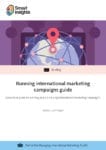4 strategies to help your agency expand abroad
As recently reported by The New York Times, the world market has finally escaped the throes of the economic crisis, as we now see every major economy enjoying simultaneous growth. While the reasons for this growth are manifold and far-reaching, one thing is clear: Businesses finding success at home in the United States are beginning to view the idea of opening offices abroad as a more viable opportunity.

It’s not hard to see why. There are 28 countries and 500 million consumers in the European Union alone. To say opportunity exists in Europe is an understatement.
But once you get to the EU, you need to have access to all those countries. Achieving this requires a carefully planned strategy.
Should your agency move abroad?
Agencies aren’t like other businesses. If you’re selling a product to consumers, you simply have to identify whether the product fits within an international market and then find a way to get it in front of that audience.
For an agency, however, moving abroad presents a variety of challenges. You’re suddenly speaking to a new demographic that may have different buying habits than domestic buyers. Laws are different, and so are cultures. Time zones are also different, which is one of the major reasons you might consider opening offices overseas.
In any case, first, consider whether you need to be in Europe at all. Does being on the ground help sales? Is there actually a tangible benefit to that?
You don’t necessarily have to be in London to do business in London. If you’re just trying to get clients residing in a particular region, you can do that from anywhere. To physically locate overseas, justify why it’s necessary to accomplish the goal.
Once you’ve decided that yes, going abroad is what you’ll do, practice the following strategies to help ensure a successful move:
1. Dig into all EU rules and regulations
Once you’re established in Europe, you’re free to do business. But before you can get underway, understand that not only are regulations different there, but you also have to be familiar with them.
For example, you might encounter a wide range of rules that apply to filing annual tax returns and value-added taxes. Additionally, those rules may highlight whether you must provide annual audits and filings as well as quarterly filings with regional authorities.
So get educated. Tons of digital resources exist to help sharpen your understanding of rules and regulations in Europe. And obviously, feel free to start at the beginning with EU’s main website — its entire “doing business” section is a jackpot of information.
If you want to expand into the U.K., for example, check out the Internet Advertising Bureau's site. This body of marketing councils brings together key stakeholders who coordinate and collaborate on the standards and best practices across disciplines and vertical markets.
2. Consider shipping carefully
As an agency, shipping might not strike you as an immediate concern, but you’ll be working directly with brands for which shipping will be a core issue. You must be prepared to address these challenges.
It starts by determining whether a client will benefit most from using domestic distribution centers, foreign warehouses, or a fusion of both. This is a complicated issue. While foreign distribution offers a variety of advantages, it also presents complications. For example, opening a foreign warehouse requires big investments, and if the expansion doesn’t pan out, it could mean costly losses.
Bottom line: The more distribution centers and other operation bases a brand has, the more complicated it becomes to ensure timely delivery while maintaining adequate inventory levels.
Study shipping and distribution options carefully. These days, a range of resources exist that can make these processes easier. Fulfillment by Amazon International, for example, can allow a brand to focus on running its company while allowing an outside entity to handle the heavy lifting.
3. Take it easy
You don't want to treat opening an office abroad like starting a new business at home, where all your employees and systems have to be in place immediately to hit the ground running.
For example, my company is currently working on European expansion plans. We want to sell the idea of bringing European brands to the States, but we can’t just set up shop overseas, start telling people we’ll bring them to America, and expect to see a return on the new office. It takes time to build a reputation for that.
Now that you have some of your people in the new region, establish who you are — especially your brand — and what you do. Then, find new clients. Take the time to learn the ecosystem as well as the nuances and differences of doing business in Europe versus in the United States.
Once you’ve become comfortable, begin the search for good marketers, start (gradually) recruiting a full team, and build out services. That said, pump the brakes on hiring an entire staff while you learn the new ropes.
Attend conventions. Reach out to potential business partners who align with your goals. Read up on competitors and players in your space — even try to meet them. You'd be surprised: Sometimes playing nice with competition can result in a valuable business relationship.
4. Show off early and often
When it comes to attracting and retaining top talent, reputation is key. So show up and get noticed quickly.
Even before you’ve launched, host events in new markets that shares insights about your company culture with locals and potential talent. Take steps to build up the reputation of your leaders on the ground and establish their desirability. That way, when you finally open your doors, you’ll find the region’s best minds waiting for you.
Expanding overseas can present massive opportunities for growth, but these opportunities don’t come without challenges. By sticking to these strategies, you’ll be prepared in terms of knowledge, planning, reputation, and talent — all of which are essential for success overseas.
Think of it this way: Global domination is just a matter of laying the right groundwork. The market is ripe for it.
Are you?

Thanks to Erik Huberman for sharing their advice and opinion in this post. Erik is founder and CEO of
Hawke Media, a Los Angeles-area outsourced digital CMO agency for companies including Evite, Bally Total Fitness, Verizon Wireless, Eddie Bauer, Red Bull and many other brands. A serial entrepreneur and a brand and marketing consultant for eight years, Erik previously founded, grew and sold Swag of the Month and grew Ellie.com’s sales to $1 million in four months. He is also available to be a
Keynote Speaker You can follow him on
Twitter or connect on
LinkedIn.




 Thanks to Erik Huberman for sharing their advice and opinion in this post. Erik is founder and CEO of
Thanks to Erik Huberman for sharing their advice and opinion in this post. Erik is founder and CEO of


